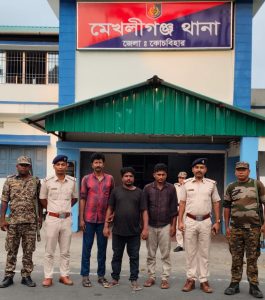Kolkata: “We were beaten and thrown out like stray dogs, even after showing our Aadhaar and voter cards. They took our money, our phones—everything—and pushed us into another country as if we were criminals,” said Nazimuddin Mandal, a mason from Murshidabad, recalling the nightmarish ordeal he and six other Bengali-speaking workers faced at the hands of the Indian authorities.
eNewsroom has long warned of the dangers facing Bengali-speaking Muslim migrants wrongly branded as Bangladeshis in BJP-ruled states. That fear has now come true—with innocent workers detained, assaulted, and pushed across the border.
Nazimuddin is among seven migrant labourers from West Bengal who were allegedly illegally deported to Bangladesh earlier this month—despite being Indian citizens and possessing valid identity documents. The shocking incident has triggered local outrage, state-level political condemnation, and exposed deep flaws in the treatment of migrant workers in India, particularly those who speak Bengali and work in BJP-ruled states.
Detained in Maharashtra, Deported via Cooch Behar
Nazimuddin Mandal, from Taritipur village in Murshidabad’s Hariharpara block, had been working as a mason in Mumbai with three others—Mehboob Sheikh of Hossainpur (Bhagwangola), Minarul Sheikh of Kajishaha (Beldanga), and Mostafa Kamal from Kulut village (Monteshwar, East Burdwan). On June 10, all four were picked up by Mumbai Police under suspicion of being Bangladeshi nationals.
What followed was both bizarre and chilling. Instead of contacting the West Bengal Police to verify their identities, the Maharashtra Police handed the four to the Border Security Force (BSF) in Siliguri. Then, without proper verification or court procedure, the BSF reportedly transported them to Zero Point, near Mekhliganj in Cooch Behar, and pushed them across the Bangladesh border—along with two actual Bangladeshi nationals.
“They didn’t ask us anything. They beat us, accused us of lying, and took away our mobile phones and all the cash we had saved. We kept shouting that we are from Bengal and showed our documents, but no one listened,” Nazimuddin said in a video message recorded and circulated from inside Bangladesh, which ultimately helped alert his village back home.

Local Alerts Lead to Rescue
Shamim Rahman, a resident of Hariharpara, said he saw the video and immediately contacted Zilla Parishad member Zillar Rahman and local MLA Niamat Sheikh. “That started the rescue process,” he said.
The matter quickly reached the office of West Bengal Migrant Workers’ Welfare Board chairman and TMC Rajya Sabha MP Samirul Islam, who then coordinated with the BSF, Border Guard Bangladesh (BGB), local police, and administration to bring the workers home. Aadhaar, voter ID, and other official documents were provided to prove their Indian citizenship.
Their families, meanwhile, were gripped by fear and uncertainty. Nazimuddin’s wife, Pinky Bibi, expressed her relief through tears: “I’m very happy to know that he is safe. I thank everyone who helped in bringing him back.”
“They Took Everything, Even My Wife’s Phone”
In a similar case, 21-year-old Fazer Mondal and his wife Taslima Mandal, both from Hariharpur village in Bagda, North 24 Parganas, faced a nearly identical ordeal. The young couple, also working in Maharashtra, were picked up by the police from Nayanagar around 2 AM on June 10.
Fazer’s father, Tahajul Mondal, said, “They called me and asked for documents. I sent everything—Aadhaar, voter ID, ration card, school certificate—on WhatsApp. They promised to release him. But then his phone went off, and we couldn’t reach him.”
On June 14, Tahajul received a WhatsApp call from someone claiming to be a BGB officer in Dinajpur, Bangladesh. During the call, Fazer confirmed what the family feared: that he and his wife had been pushed across the border, after Maharashtra Police confiscated their documents and phones.
“I don’t know how to get my son back,” Tahajul had told reporters, his voice breaking. “He is a citizen of India. His only fault is that he speaks Bengali.”
The family’s desperate appeals finally led to action. After diplomatic intervention and sustained pressure from local leaders and the West Bengal government, the BSF arranged a flag meeting with BGB, and the couple was brought back through the Koyladangi border at Bindol in North Dinajpur. They were handed over to Raiganj Police Station and have now been reunited with family.
Political Outrage: “A Grave Injustice Because They Spoke Bengali”
The incident has sparked widespread condemnation. TMC MP Samirul Islam termed the deportation an “unconstitutional, discriminatory act”, targeting Bengali-speaking Indian citizens.
He posted on X (formerly Twitter):
“Under the leadership and active intervention of our Hon’ble Chief Minister Mamata Banerjee, we were finally able to repatriate seven Indian citizens who were illegally deported to Bangladesh. This grave injustice was committed simply because they spoke Bengali.”
Islam demanded accountability and raised three sharp questions:
- Why did Maharashtra Police hand over Indian citizens to the BSF without informing the West Bengal government?
- Why didn’t the BSF verify their documents with local or state authorities before deportation?
- Is there a larger coordinated effort by BJP-ruled states and security agencies to target Bengali-speaking migrant workers?
“These workers had all the documents—Aadhaar, voter ID, even birth certificates. Still, they were treated like illegal aliens and dumped at a foreign border,” Islam said. “We will not let this issue go. We will expose the dark forces behind this misdeed and ensure accountability.”
BSF Contacts BGB, Police Escort Workers Back
According to Murshidabad Police, following high-level intervention, the BSF contacted the BGB, and the four workers originally deported from Mumbai were returned to India and handed over to Behar District Police. A Murshidabad police team has since travelled to bring them home.
MLA Niamat Sheikh, who has been closely following the case, said, “Nazimuddin is a legal citizen of India. Despite valid identity documents, he and three others were labeled as Bangladeshis and thrown out. I have reported the matter to our party leadership.”
A Pattern of Profiling?
Human rights activists and migrant workers’ groups warn that this is not an isolated incident. The deportation of legal citizens without trial, verification, or even basic administrative inquiry raises serious concerns—not only about procedural lapses, but about ethnic and linguistic profiling.
“These are not just mistakes. These are acts of systemic violence against the poor, against those who leave home to earn a living and dare to speak in their mother tongue,” said a migrant rights activist who is helping document the cases.
As all seven workers make their way back to the safety of their villages in West Bengal, the trauma remains.
“We were not criminals,” Nazimuddin said again. “But they made us feel like we didn’t belong in our own country.”


